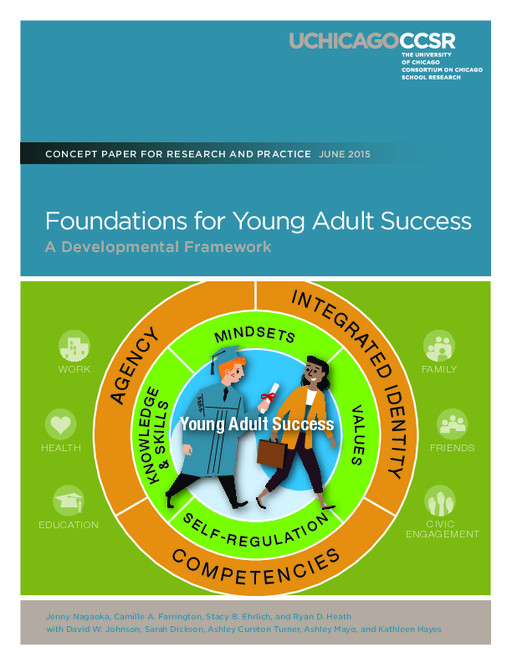Research Approach
In November 2013, the University of Chicago Consortium on Chicago School Research (UChicago CCSR) was awarded a competitive grant from The Wallace Foundation to build a conceptual framework that articulates what is needed to guide children and youth to become successful young adults. The charge was to analyze and synthesize the best of research evidence, theory, expert opinion, and practice wisdom in the service of identifying the broad range of factors critical for young adult success. The authors consolidated current understanding of how these factors can be fostered in schools, communities, and homes from early childhood to young adulthood. In addition to a thorough grounding in published research, the project included interviewing and holding convenings and meetings with experts in research, policy, and practice across a range of fields and disciplines. To further ground the synthesis in real-world problems, they also interviewed a diverse selection of nine youth and the adults who work with them in schools, community programs, and agencies in Chicago and developed youth profiles. The authors sought to find the points of agreement across disparate perspectives, raise the points of contention, and leverage the collective wisdom to best understand the full scope of factors essential to young adult success and how to develop them.
The Three Phases of the Project
To achieve a cohesive and comprehensive framework, the project team undertook three phases of information gathering. Each successive phase built upon the work of the previous phase, and each phase was defined by a different goal and set of questions:
- Phase l: The team focused on defining “success” and identifying the factors that are critical for success in young adulthood, particularly in college and at the beginning of a career.
- Phase II: Building on the critical factors identified in Phase l, they sought to understand how each factor developed over the course of early life, from the preschool years through young adulthood. They focused on the identification of leverage points for best supporting children’s holistic development, keeping in mind that child and youth development occurs in multiple settings.
- Phase III: The team aimed to consolidate current understanding of how critical factors of young adult success can be fostered in a holistic, coordinated way across schools, community organizations, and homes, from early childhood to young adulthood. They focused on a ground-level, practitioner perspective in considering how to best organize adult efforts to promote the development of children and youth.
The current report is a culmination of the three phases of work outlined above, with an emphasis on the learnings from Phases I and II.

